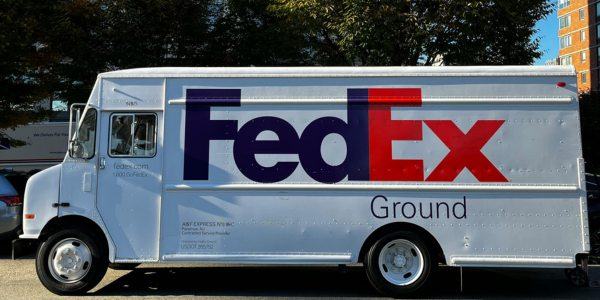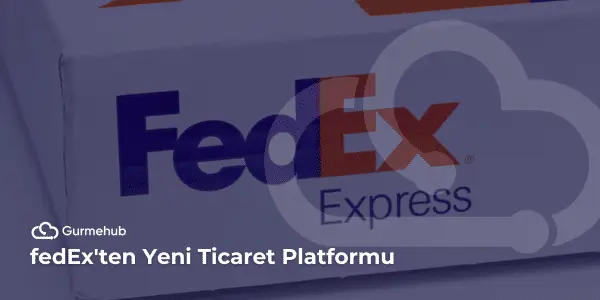In an interview with Supply Chain Drive, a FedEx executive talks about whether fdx will work with other delivery providers to integrate with e-commerce giants like Amazon. It aims to do more than just deliver packages and make a name for itself in the e-commerce world.

In January, the shipping giant announced a platform offering end-to-end solutions for online merchants. The platform, called Fdx, brings together a mix of existing and new FedEx services aimed at helping businesses increase demand, optimize the supply chain and streamline the order returns process. It is currently available in private preview, with the official launch scheduled for the fall.
Some e-commerce experts have expressed skepticism that these services will make a notable impact on the industry. But so far FedEx has seen a "pretty strong debt of interest" for the new platform, Scott Rogers, vice president of FedEx Dataworks, responsible for digital capabilities, said in an interview with Supply Chain Dive.
The platform uses insights from FedEx's movement, which moves close to 15 million packages a day, and the company's evolving machine learning capabilities. This allows FedEx to calculate when a package should arrive, the likelihood of delivery delays and other key data points and share them with shipments, Rogers said.
One of the key components of the platform is the system that matches a business's inventory location, order and product data with shipping insights derived from FedEx's network. This helps a business make a more informed choice about how to most effectively deliver to a customer, rather than just estimating a one- or two-day delivery timeframe.
"tell us the promise you're trying to meet, tell us where the inventory is and we'll give you the best recommendation for using our network when deciding to meet," Rogers said.
Can FedEx work with Shopify and Amazon?
"Making it easy for businesses to join fdx and start using it is a priority," Rogers said, as this will help customers of all sizes take advantage of its capabilities. The platform integrates with the stores and order management systems that merchants often interact with.
"If you are selling in the Shopify ecosystem, then a compatibility between Shopify and the Fdx platform might be possible."
Fdx is building a mix of skills that go beyond transportation insights.
For example, the ability to connect with millions of consumers whose businesses are part of FedEx's ShopRunner membership program, Rogers noted. Acquired in 2020 by FedEx, ShopRunner offers consumers perks such as free two-day delivery.
"After acquiring ShopRunner, we are using our consumer reach and access to brands to bring them together in the ShopRunner experience," he said.
The platform also aims to help businesses streamline and customize their returns process. A business can set up a returns policy through the platform, such as determining and incorporating product eligibility, including how much level of automation is involved in the return approval stage.
But fdx is not yet integrated with every major e-commerce player. Rogers said integrations for Amazon are not yet "deepened". "We don't really have a timeline or position on when or what position it is with respect to the Amazon integration," he added.
Applying Fdx's capabilities to deliveries to non-FedEx scanners would attract additional interest in the digital platform, experts say.
Drew Angerer / via Getty Images A FedEx worker unloads packages from a delivery truck on March 31, 2020.
"A long journey for fdx"
"While FedEx can offer detailed insights for deliveries within its own network through fdx, the company is still exploring how the platform can be applied for shipments made through delivery providers," said Rogers. "We aim to be relevant in the multi-carrier world for our customers," Rogers said.
"A future that provides the multi-carrier capabilities Rogers outlined would have far more traction for fdx than the idea of single carrier." is the view of Rick Watson, founder and CEO of RMW Commerce Consulting.
"While the services offered through fdx are convenient for merchants, sticking with FedEx on a single carrier will often limit their value to the business," said Watson, adding that small merchants who only use fedEx and large businesses that really depend on FedEx will benefit from two sets of benefits.
Even if Fdx eventually offers multi-carrier capabilities, Watson said many companies offer similar services that can collaborate with various delivery providers. "It's worth noting that every single thing that's been mentioned is something that five or six companies are already doing," he added. However, the platform's reliance on FedEx's delivery network alone could offer some advantages for the company, according to Derek Lossing, former Amazon Logistics leader and now founder and principal advisor at Cirrus Global Advisors. Lossing said that if shippers find fdx useful, it would give them one more reason to continue using FedEx for deliveries at a time when tech companies are making it easier to shift volume between providers.
"The switching costs between UPS, FedEx and OnTrac are quite low," Lossing said. "What FedEx is trying to do here is develop some value-adding solutions that make their delivery services a little more connective." Still, Lossing noted that it will take time for the fdx platform to attract customers, which is the case with similar e-commerce solutions on the market. "It's going to be a journey that's going to take a lot of years...It's really going to depend on them thinking about how to retain customers and how they invest in some of these solutions, because sometimes it can be hard to make money."



